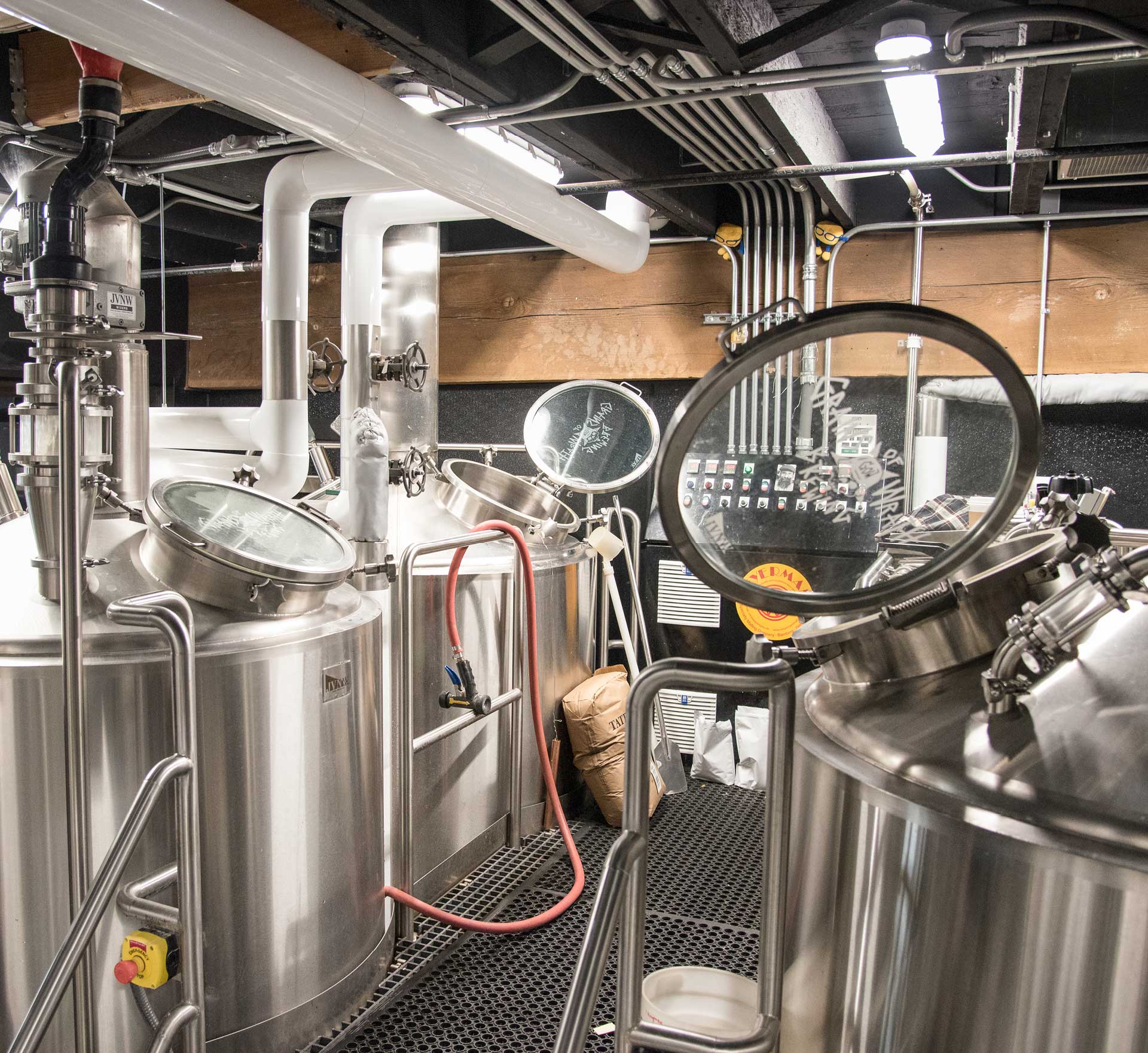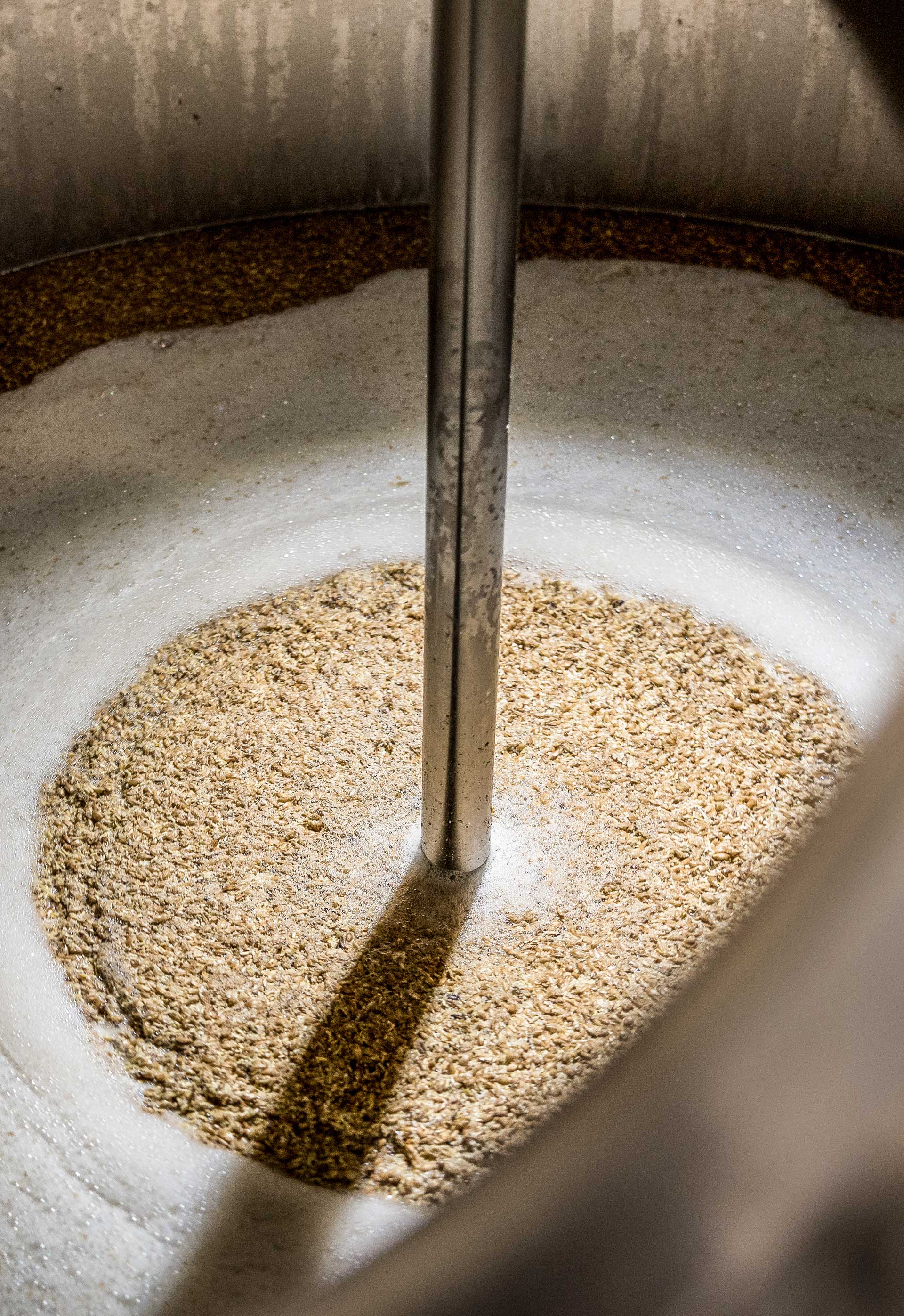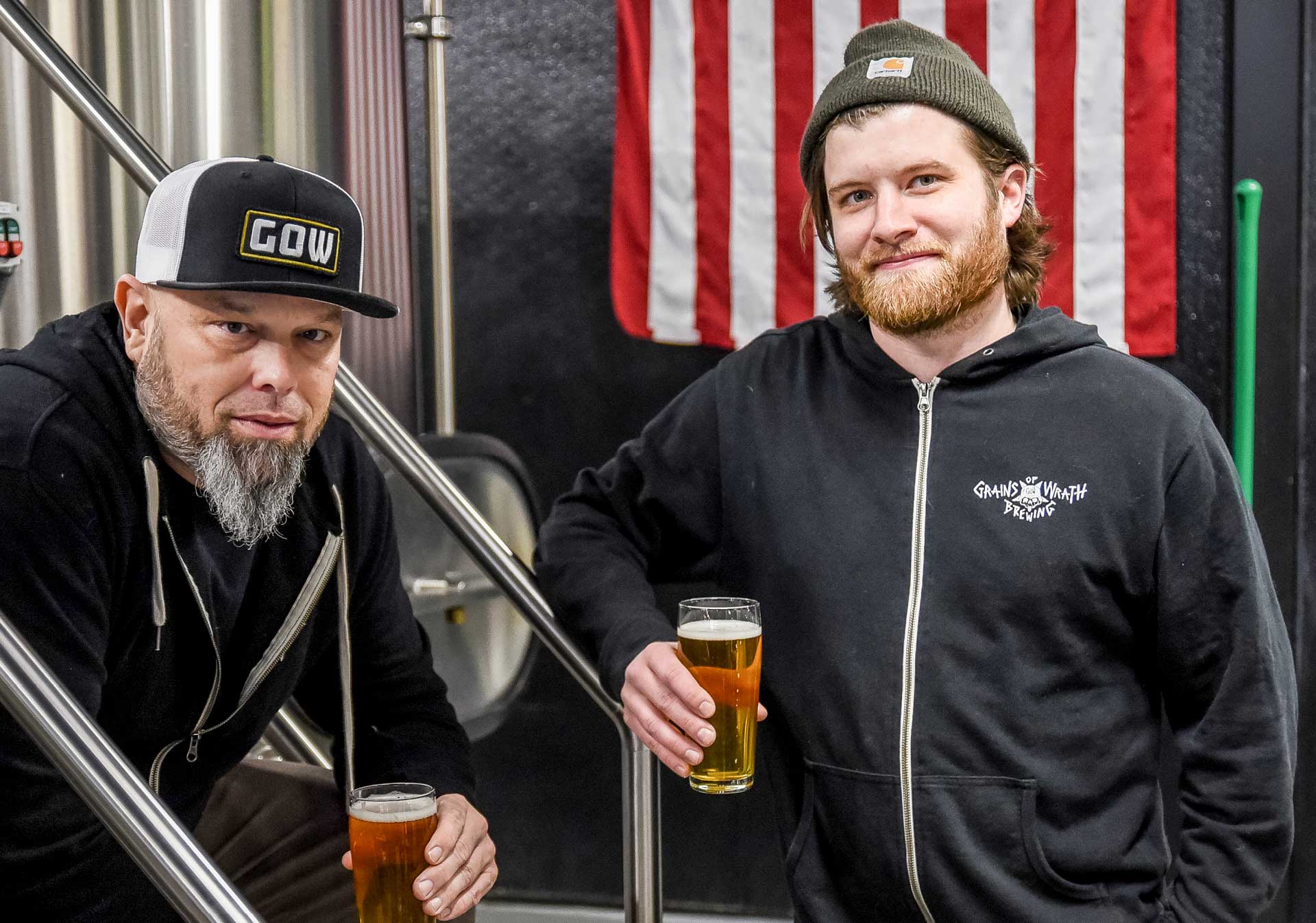In just about any other town, Mike Hunsaker’s goal would be modest. In one the world’s most brewery-rich cities, it’s highly ambitious: When brewing colleagues come to the Portland area and they ask each other which three or four breweries they can’t miss, he wants Grains of Wrath to be on that shortlist.
“You want to make beers of the quality that your peers respect you,” says Hunsaker, the head brewer and cofounder. “I know that I’m doing something right when I come into the taproom and I see brewers.”
He and his team are making a strong case. Locally, Grains of Wrath is best known for its bright, clean, bitter-but-balanced West Coast IPAs. Its Citra-hopped Crypt Keeper thrilled our blind-tasting panel (and us) earlier this year, finishing as one of our Best 20 Beers of 2020. The lagers are gaining momentum, too, competing with the IPAs for top sales over the summer. Meanwhile, the Vienna Lager wears two Great American Beer Festival medals—bronze in 2018, just a few months after the brewery opened, and then a silver in 2019.
That’s the kind of respect that motivates Hunsaker. “We’re a small brewery,” he says. “We’re not going to get real big. That’s never been a goal of mine. I want beer that’s sought-after instead of just being able to pick it up anywhere.”
The beers have a strong reputation locally and continue to win new fans. That’s a process that Hunsaker enjoys watching from behind the glass at the brewery, as people order a flight, start tasting, and start talking. “I’m just thankful people are interested, to be honest with you,” he says.
The original 10-barrel brewery is in Camas, Washington—essentially a northeast suburb of Portland that happens to be on the north side of the Columbia River, not as far-flung as it looks. However, as we go to press, Grains of Wrath is on the verge of opening a second brewery and taproom in vibrant Northwest Portland. The site is the former home of Lompoc Brewing, which closed in 2019 after 23 years. That followed the closures of other long-running breweries: BridgePort, Columbia River, and Burnside all shut in 2019, as did Widmer Brothers’ Portland taproom. Alameda Brewing closed the year before.
“This is a very competitive market now,” Hunsaker says. “Customers’ beer IQ is at the highest it’s ever been. So, you’ve got to be thankful and stay on point to stay relevant. We’re seeing a lot of legacy breweries that sat back on their laurels and are gone now, especially in the past year, two years. Especially in Portland, we’ve seen a lot of places that just were like, ‘Oh cool, I’m going to make the same IPA I made in ’98, you know? And it doesn’t work that way anymore.
“I just want to stay relevant and keep people excited about what’s coming out next.”

Mid-Life, Cross-Country
Brewing was a late career change for Hunsaker, who turns 50 in January. Born in Illinois and raised in Chicago, he worked in sales for years before the stress became too much. “My doctor told me I had to quit, so my ex made me quit.” He then took up trucking, driving across the country for a couple of years before sticking with local routes for a Chicago-area lumber company. He liked driving just fine; it paid well, even though “it was boring as hell,” he says. That lasted until 2009, when people stopped building after the financial crisis, and the lumber company closed.
Hunsaker needed a job. By that time, his parents were living in Virginia Beach, Virginia, and they persuaded him to move there and hit the reset button. He also had been homebrewing for about eight years by then, and he had a notebook full of recipes. One day in 2010, he walked into a weeks-old brewpub called Beach Brewing (now known as Reaver Beach) and offered to help out. For months he worked for nothing. Then he worked for peanuts. Eventually he and the owner had a disagreement. Hunsaker left, and again he needed a job—but now he had experience and knew he wanted to brew.
“When I left, I needed to work for a brewery that was world-class,” he says, “and I wanted to learn a lot more than I could’ve done on my own.”
A couple of years earlier, at the Great Taste of the Midwest fest in Madison, Wisconsin, Hunsaker had met Matt Cole, cofounder and brewmaster at Fat Head’s Brewery near Cleveland, Ohio. Hunsaker called him up and said he was looking for work. At the time, Cole had only an entry-level opening on the packaging line—and Hunsaker took it. “I’ll earn my way in,” Hunsaker told him, assuring Cole that he would work his way up to the brew deck. And he did, joining a team of perennial GABF medal winners and learning from their meticulous approach.
“That was a big jump in my career,” he says. “I wanted to work for those guys.… I wanted to learn from someone who could do so many styles—and do them in such a high-quality manner. So, basically I kind of clawed my way in there and started working.”
That’s how he won the chance to run his own brewery, when Fat Head’s boldly opened a franchise in Portland, Oregon. Hunsaker’s journeys had taken him from the Midwest to the East Coast, back to the Midwest, and finally to the West Coast. “I moved one-third of the way across the country. What’s two-thirds more? The way I sold it was, ‘I get it, you can find brewers out there. But who knows what Fat Head’s beer tastes like more than one of your own brewers?’”
“It’s been the greatest move in my career,” he says. “What better place to prove yourself than Portland and the West Coast?”
Initially, Fat Head’s was a tough sell in Portland. What do these guys from Ohio know about beer, anyway? A local weekly described the branding as “oafish” and suggested that merely reading the Midwestern-hearty food menu would lead to high blood pressure.
Hunsaker’s approach was simple: Ignore the noise and make great beer. “You take that chip, you put it on your shoulder, and you get to work. Keep your mouth shut, do what we do, and we’ll get there.” In his first year there, 2015, the Portland Fat Head’s brewpub took home GABF gold for a rye bock. The beers won the locals over, too—especially the IPAs. Hunsaker began to put his own spin on them and build a reputation. “From then on it just snowballed,” he says. “I was very lucky; people were very cool. We worked very hard to be part of the [local] fabric.”
After a couple of years, he began to think about how he might start his own small brewery. Living in Camas, Hunsaker was a regular at Caps N’ Taps, a beer bar run by Brendan Greenan. The two began to talk. “We were sitting there one night, having had a couple beers, and it was one of those, ‘This area could use a brewery. Something different.’ It just kind of starts as that shit-talking, really. And then it becomes serious.”
That shit-talking evolved into Grains of Wrath. They brought in local business people Shawn Parker and Brendan Ford to invest and join the partnership. Hunsaker’s longtime right-hand man Owen Lamb—they’ve been brewing together since Fat Head’s in Columbus—also joined the team.

Right Out of the Gate
The brewery opened in March 2018 and almost immediately began to collect local accolades. After only a few months, Grains of Wrath took home six medals plus the “Very Small Brewery of the Year” honor from the Washington Beer Awards. The first GABF medal came later in the year.
“You hope to be at least ‘this far’ from where you want to be,” Hunsaker says. “But we realized we were a lot closer. We tasted it. We’re like, ‘Are we fooling ourselves? All right, let’s send all this stuff in, and get some feedback from real judges.’ That’s what kind of let us know we were on the right track earlier.”
In Camas, they brew on a 10-barrel, three-vessel system. That third vessel allows them to do what Hunsaker calls “pseudo- decoctions” on certain classic styles, such as Czech-style lagers and hefeweizen. For those, he’ll move half the mash over to the lauter tun and boil the remaining half for perhaps 10 or 15 minutes. Then he’ll move the boiled portion to rejoin the rest of the mash, raise its temperature, and proceed with lautering. “So, it’s not like going back and forth,” he says. “But I’m getting that Maillard reaction that’s just beautiful and delicious. You’ve got to have it.”
Hunsaker loves lagers—their own Frost Hammer Helles is a regular go-to for him. He and Lamb have known from the beginning that Grains of Wrath could specialize in them. “Everyone’s coming around to lagers now in the past couple years, which is great. But when Owen and I sat down and said, ‘All right, what do we see us doing and being?’—and you know, IPAs pay the bills and everything else—but one of the other things we were really passionate about was to make lager, and to make some of the best lager in this area.”
While Portland is now catching on to those lagers, IPA still pays the bills. “You have to be, obviously, financially responsible, as well as be true to yourself,” Hunsaker says. “You’ve got to come out of the gate with IPAs. You’re in Portland.”
American IPA is always evolving. What we have seen recently is some resurgence of interest in the clearer West Coast style, as well as some East-West hybrids—sometimes they’re hazy but dryish and bitterish; other times they’re bright and clear but juicier in the middle. Grains of Wrath walks the latter path, where brighter IPAs with ample bitterness nonetheless have a juicy dimension and often embrace newer, fruit-forward hop varieties.
Their top-seller Dystopia gets the so-called “holy trinity”: Simcoe, Citra, Mosaic. “I don’t think you can put that [trio] into any beer and make it worse,” Hunsaker says. He’s also excited about Strata, as well as the Amarillo they get from Crosby Hop Farm in Woodburn, Oregon.
“Where I’ve really kind of opened things up more is New Zealand,” Hunsaker says. “Everybody loves big oily dank hops from Australia, but the dank-but-refined fruit flavors and compounds that we get out of that New Zealand hop varietal group is just fantastic.” His favorites there include Nelson Sauvin—he cites Alpine’s Nelson IPA from the San Diego area as a big influence—as well as Waimea and Rakau. In fact, before the pandemic shut things down, Hunsaker and Lamb were planning to visit New Zealand in April for the harvest.
Grains of Wrath does brew one hazy IPA, but they’re better known for the brighter, more bitter West Coast style. Hunsaker specifically says that his own style is more inspired by San Diego breweries—such as Alpine and Pizza Port—but also that he likes just a bit higher finishing gravity to help balance things out. Their IPA base is predominantly pilsner malt—and they like Rahr Premium Pilsner, in particular. They also like Weyermann for specialty malts, leaning on Vienna or Munich rather than crystal malt. “I try to keep those malts clean,” Hunsaker says. “Just background. All background.”
For what he calls “big, oily hops,” he’ll turn to Munich malt as well as a touch of low-Lovibond crystal in small amounts. “I like keeping everything pretty light on the color, and then on the percentages, no more than 15 percent, maybe 20. Maybe a bit of wheat.”
Hop creep is a concern—that’s when hops that have been lightly kilned, to preserve those aromatic oils, bring diacetyl precursors with them to the fermentor. Hunsaker’s solution is simple: Give it time. “My IPAs are not fast,” he says. His IPAs take about 24 days to make because they see spikes in those diacetyl precursors (vicinal diketones, or VDK) after the first few days of dry hopping. “And they’re usually gone around Day 8. So, it’s definitely elongating the beer-making process.… Now, you’ve got to wait your time. You have a choice: Do you want big oils and flavor, and have to wait for the creep; or do you want to have it go fast? I’d rather have the oils.”
That patience fits their overall approach. They pay attention to details, and they don’t rush the beer—neither the lagers nor the IPAs. “Water profiles, ingredient quality, patience,” he says. “Lagers are minimum six weeks, no question.”
He says that often means disappointing distributors who want the beer sooner. “When it’s ready, it’s ready.”

Listen, and Ask Questions
Hunsaker didn’t start homebrewing until he was in his 30s, and his pro career really didn’t take off until he was about 40. Today, he does what he can to help out local homebrewers—offering ingredients, fresh yeast, and advice.
“Just ask questions,” he says. “Brewers aren’t that upset, you know?” He recalls a cartoon he saw recently, in which a homebrewer is going on ad nauseum about his hobby to a pro brewer who can’t get a word in. “Listen more than talk,” he says. “Brewers are happy to talk to you about it. I’m happy all the time. I love my job. This is something that I never want to lose. So, ask a lot of questions. Don’t be afraid to not know.”
More advice: “Don’t rush. I get that it’s a hobby, and you have to do it on the weekends. But there are certain things that I could tell myself about back then. Use better ingredients. You don’t have to get just whatever down the street has. You can search it out.”
For those who want to go pro: “I think it’s about working for the right places that teach you about recipe development and just simple technique.” But most of all: “Listen,” he says. “It’s part of the thing I had to do coming into Fat Head’s. I was like, ‘All right, I have some preconceived notions of things. But I’m going to come in like I’m a newbie and just keep my mouth shut.’ Don’t be afraid to look dumb, even when you’re in the business.”
Something Hunsaker is looking forward to in 2021: Traveling and catching up on brewing collaborations with those peers that he respects. “I just want to go make some beer with friends,” he says.
Listen Up! Tune in to the Craft Beer & Brewing Magazine® podcast episode 153 for more on brewing from Grains of Wrath’s Mike Hunsaker. beerandbrewing.com/podcasts
